Computers Quotes
Most popular computers quotes

People who are really serious about software should make their own hardware.

Computers are better than we are at arithmetic, not because computers are so good at it, but because we are so bad at it.

It is unworthy of excellent men to lose hours like slaves in the labour of calculation which could safely be relegated to anyone else if machines were used.
The whole of the development and operations of analysis are now capable of being executed by machinery. ... As soon as an Analytical Engine exists, it will necessarily guide the future course of science.
We may say most aptly that the Analytical Engine weaves algebraic patterns just as the Jacquard-loom weaves flowers and leaves.
The Analytical Engine has no pretensions whatever to originate anything. It can do whatever we know how to order it to perform. It can follow analysis; but it has no power of anticipating any analytical relations or truths. Its province is to assist us to making available what we are already acquainted with.
People can still pull the computer's plug. However, we may have to work hard to even maintain that privilege.
I propose to consider the question, "Can Machines Think?"

The real problem is not whether machines think but whether men do.

Computers are useless. They can only give you answers.

Man is still the most extraordinary computer of all.
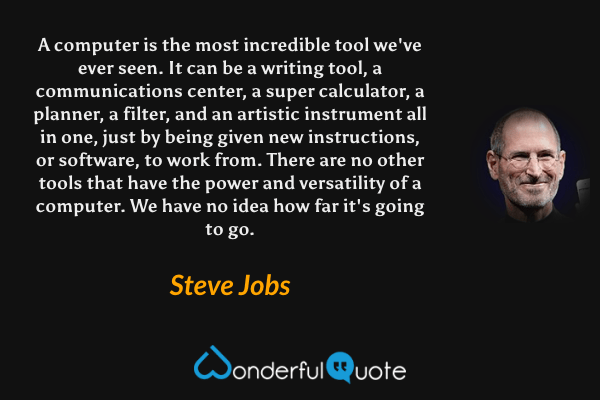
A computer is the most incredible tool we've ever seen. It can be a writing tool, a communications center, a super calculator, a planner, a filter, and an artistic instrument all in one, just by being given new instructions, or software, to work from. There are no other tools that have the power and versatility of a computer. We have no idea how far it's going to go.
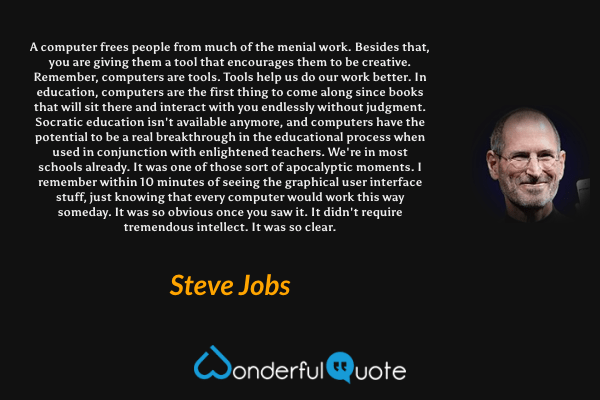
A computer frees people from much of the menial work. Besides that, you are giving them a tool that encourages them to be creative. Remember, computers are tools. Tools help us do our work better. In education, computers are the first thing to come along since books that will sit there and interact with you endlessly without judgment. Socratic education isn't available anymore, and computers have the potential to be a real breakthrough in the educational process when used in conjunction with enlightened teachers. We're in most schools already. It was one of those sort of apocalyptic moments. I remember within 10 minutes of seeing the graphical user interface stuff, just knowing that every computer would work this way someday. It was so obvious once you saw it. It didn't require tremendous intellect. It was so clear.
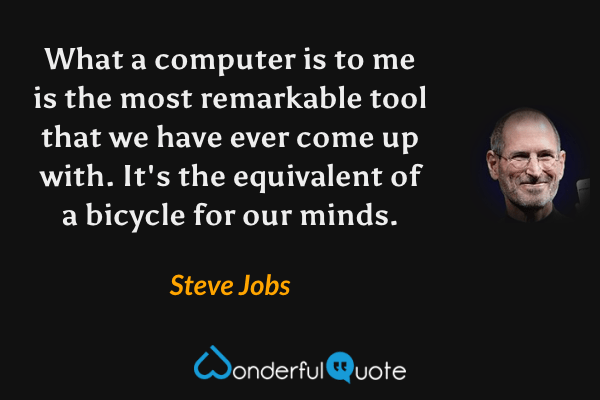
What a computer is to me is the most remarkable tool that we have ever come up with. It's the equivalent of a bicycle for our minds.
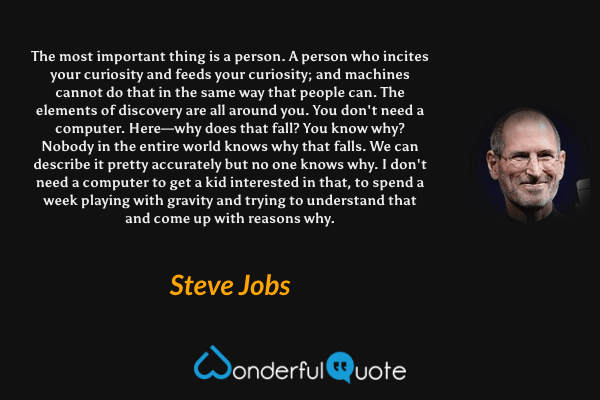
The most important thing is a person. A person who incites your curiosity and feeds your curiosity; and machines cannot do that in the same way that people can. The elements of discovery are all around you. You don't need a computer. Here—why does that fall? You know why? Nobody in the entire world knows why that falls. We can describe it pretty accurately but no one knows why. I don't need a computer to get a kid interested in that, to spend a week playing with gravity and trying to understand that and come up with reasons why.
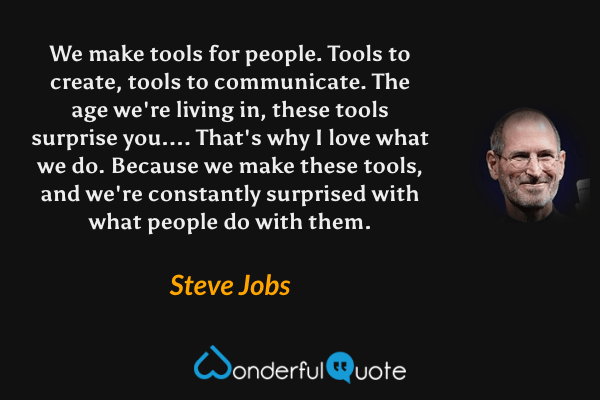
We make tools for people. Tools to create, tools to communicate. The age we're living in, these tools surprise you.... That's why I love what we do. Because we make these tools, and we're constantly surprised with what people do with them.
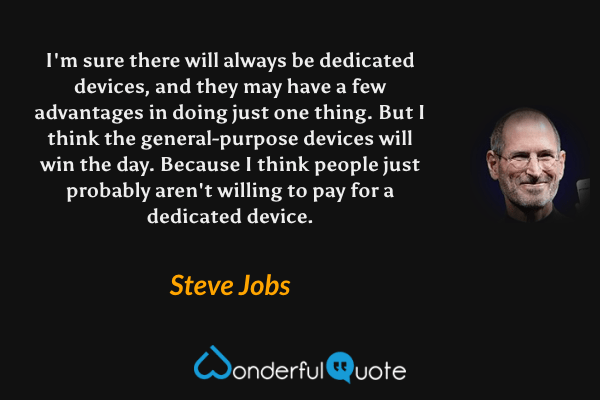
I'm sure there will always be dedicated devices, and they may have a few advantages in doing just one thing. But I think the general-purpose devices will win the day. Because I think people just probably aren't willing to pay for a dedicated device.
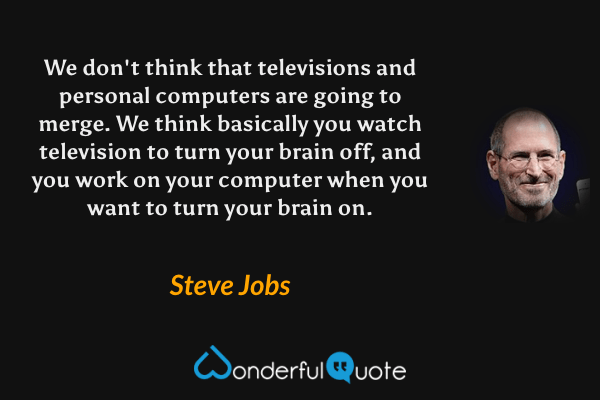
We don't think that televisions and personal computers are going to merge. We think basically you watch television to turn your brain off, and you work on your computer when you want to turn your brain on.
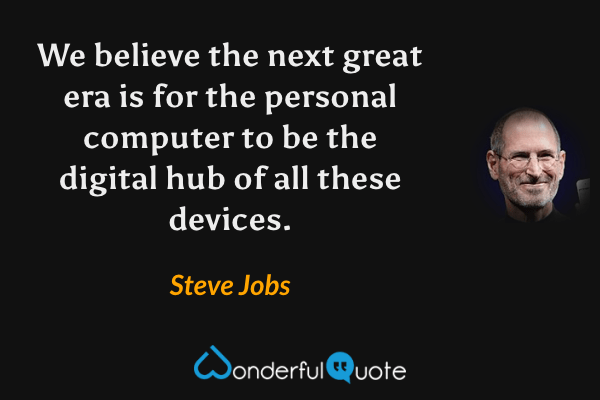
We believe the next great era is for the personal computer to be the digital hub of all these devices.
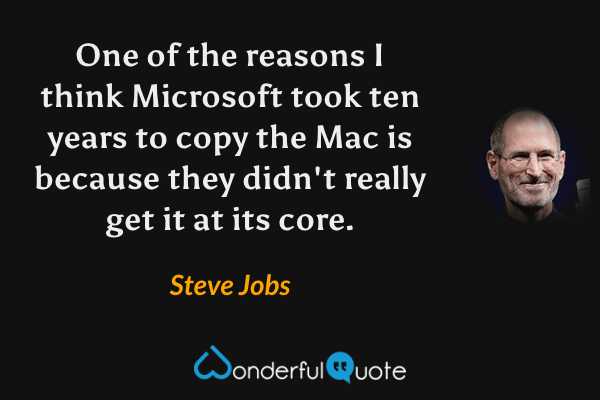
One of the reasons I think Microsoft took ten years to copy the Mac is because they didn't really get it at its core.
The book is here to stay. What we're doing is symbolic of the peaceful coexistence of the book and the computer.
The mind can store an estimated 100 trillion bits of information - compared with which a computer's mere billions are virtually amnesiac.
Men are going to have to learn to be managers in a world where the organization will come close to consisting of all chiefs and one Indian. The Indian, of course, is the computer.
Not even computers will replace committees, because committees buy computers.
If you put tomfoolery into a computer, nothing comes out of it but tomfoolery. But this tomfoolery, having passed through a very expensive machine, is somehow enobled and no-one dares criticize it.
Computers can figure out all kinds of problems, except the things in the world that just don't add up.
In a few moments they can make a mistake so great that it would take many men many months to equal it.

The new electronic independence re-creates the world in the image of a global village.

The real danger is not that computers will begin to think like men, but that men will begin to think like computers.

The more the data banks record about each one of us, the less we exist.
The presence of humans, in a system containing high-speed electronic computers and high-speed, accurate communications, is quite inhibiting.
Immunity to boredom gives the computer the edge.

The computer is more than a tool, it is a medium. Just as the typeface standardized information changing us from a society where information was at the mercy of monks busy with hand copying into a fact-loving society where nonfiction outsell fiction so the computer will change the way we look at the world.
If the automobile had followed the same development cycle as the computer, a Rolls-Royce would today cost $100, get a million miles per gallon, and explode once a year, killing everyone inside.

A computer terminal is not some clunky old television with a typewriter in front of it. It is an interface where the mind and body can connect with the universe and move bits of it about.
Computers are like men because they have a lot of data but are still clueless.
Computers are like women because once you acquire one you spend all your money on accessories.

Buying the right computer and getting it to work properly is no more complicated than building a nuclear reactor from wristwatch parts in a darkened room using only your teeth.

A computer is a stupid machine with the ability to do incredibly smart things, while computer programmers are smart people with the ability to do incredibly stupid things. They are, in short, a dangerously perfect match.

I have bought this wonderful machine—a computer. Now I am rather an authority on gods, so I identified the machine—it seems to me to be an Old Testament god with a lot of rules and no mercy.
What a computer is to me is the most remarkable tool that we have ever come up with. It's the equivalent of a bicycle for our minds.

The PC is the LSD of the '90s.

The computer is by all odds the most extraordinary of all the technological clothing ever devised by man, since it is the extension of our central nervous system. Beside it, the wheel is a mere hula-hoop.
Your computer is a backup of your soul, a multilayered, menu-driven representation of who you are, who you care about, and how you sin.

The newest computer can merely compound, at speed, the oldest problem in the relations between human beings and in the end the communicator will be confronted with the old problem of what to say and how to say it.
With the internet, a computer is a door rather than a box.
Terrified of being alone, yet afraid of intimacy, we experience widespread feelings of emptiness, of disconnection, of the unreality of self. And here the computer, a companion without emotional demands, offers a compromise. You can be a loner, but never alone. You can interact, but need never feel vulnerable to another person.

If you were plowing a field, which would you rather use? Two strong oxen or 1024 chickens?
Anyone who has lost track of time when using a computer knows the propensity to dream, the urge to make dreams come true and the tendency to miss lunch.
Anyone who considers arithmetical methods of producing random digits is, of course, in a state of sin.
Some people are saying that we ought to put an IBM PC on every desk in America to improve productivity. It won't work. The special incantations you have to learn this time are the 'slash q-zs' and things like that. The manual for WordStar, the most popular word-processing program, is 400 pages thick. To write a novel, you have to read a novel––one that reads like a mystery to most people. They're not going to learn slash q-z any more than they're going to learn Morse code. That is what Macintosh is all about.
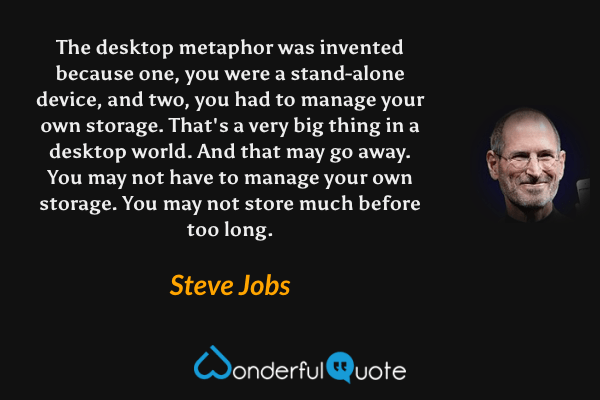
The desktop metaphor was invented because one, you were a stand-alone device, and two, you had to manage your own storage. That's a very big thing in a desktop world. And that may go away. You may not have to manage your own storage. You may not store much before too long.
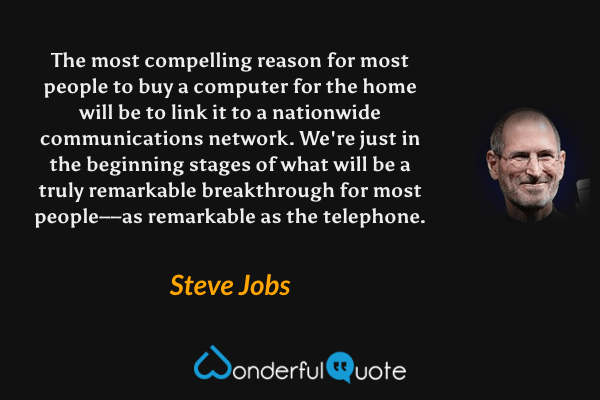
The most compelling reason for most people to buy a computer for the home will be to link it to a nationwide communications network. We're just in the beginning stages of what will be a truly remarkable breakthrough for most people––as remarkable as the telephone.
Man is a slow, sloppy and brilliant thinker; the machine is fast, accurate, and stupid.

The goal of computation is the emulation of our synthetic abilities, not the understanding of our analytic ones.

The cybernetic exchange between man, computer and algorithm is like a game of musical chairs: The frantic search for balance always leaves one of the three standing ill at ease.

Prolonged contact with the computer turns mathematicians into clerks and vice versa.

The computer is the ultimate polluter. Its feces are indistinguishable from the food it produces.

Within a computer natural language is unnatural.


